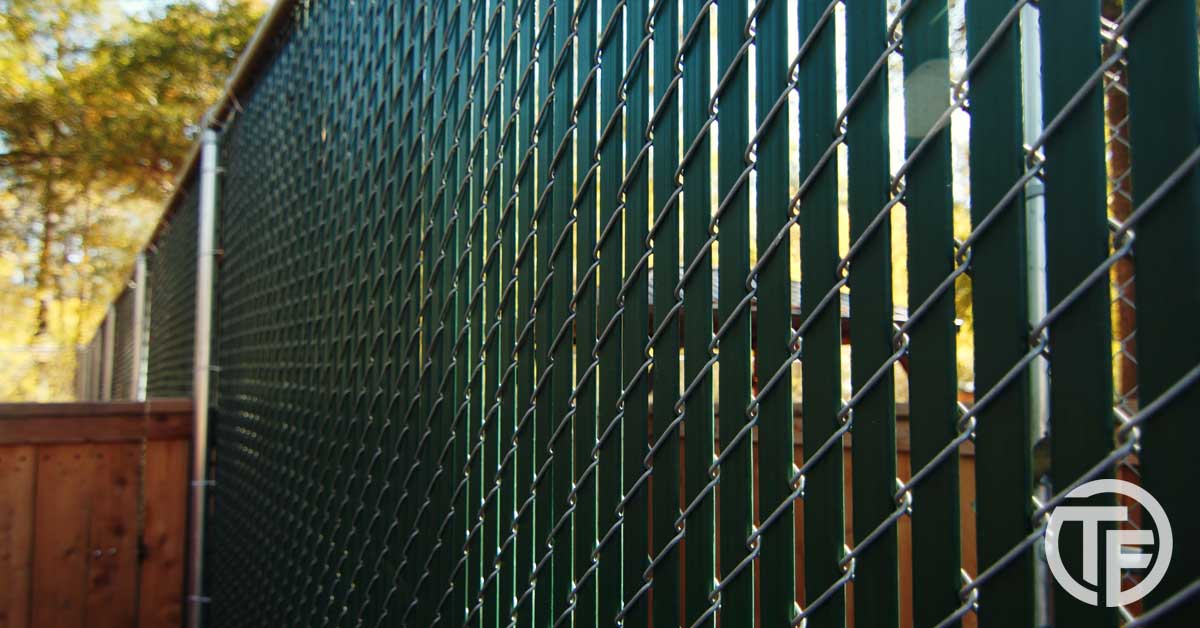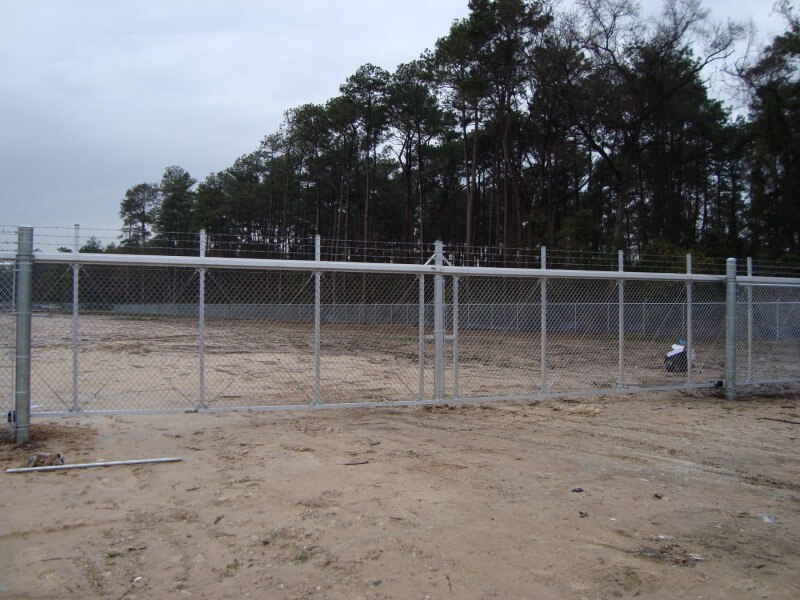Chain Link Security Fences
Security and Protection of Chain Link Security Fences

You’ve likely seen them before; dotted along the perimeter of homes, parks and commercial businesses. Chain link fences are a common sight in most areas of the United States, serving a multifunction role to protect property and property owners. If you’re the owner of a property, you know the importance of protection and security. After all, you put time and effort into making your space appealing—why not make it secure too?
So, let’s talk about one of the oldest and most-trusted forms of security: the chain link fence.
What is Chain Link Security Fencing?
Chain link security fencing is a reliable, long-lasting and cost-effective way of establishing a secure perimeter around any property or facility. This barrier typically stands at a height anywhere between four to twelve feet tall and is composed of galvanized steel mesh with diamond-shaped openings. These metal posts have either been slotted together or twisted individually and then connected to form this durable and weatherproof fence. Depending on the purpose, these fences can either feature razor wire along the top perimeter, or privacy screening to shield it from prying eyes.
The primary benefit of chain link security fencing is that it provides an effective physical barrier against undesired persons or animals while still allowing unrestricted visibility into the area beyond its barriers. As such, it’s highly beneficial for commercial spaces such as warehouses, factories, airports, and military facilities where there is a need to keep some areas off limits. It also does an excellent job of deterring opponents from attempting to trespass in these places due to its intimidating size and strength.
Alternatively, some critics argue that chain link security fencing misses out on the added layer of protection that barbed wire provides by opting for diamond-shaped tubes in lieu of between each metal post. However, this is offset by the fact that unlike barbed wire, it causes no injury if touched by humans or otherwise strained since its posts are more flexible. With this in mind, it still effectively serves its purpose of restricting access for both intruders and pets alike without endangering their health in any way.
As such, chain link security fencing remains one of the most popular options when it comes to achieving maximum security while maintaining the ability to observe activity on the other side. The materials used to build it are dependable yet budget-friendly and can indeed be trusted to protect your premises without fail.
Materials Used For Chain Link Construction
Chain link fencing is one of the oldest and most reliable types of fencing for security and protection. Its most notable advantage over other types of fencing materials lies in what it is made of. Chain link fencing can be constructed with a variety of materials, each with its own unique set of benefits to consider when selecting the right material for your needs.
Galvanized steel chain link fencing is the most popular and cost-effective option available on the market today. Its galvanization process coats the steel, protecting it from rust and corrosion, making it resilient against the elements and increasing its lifetime value. Other steel options include aluminum and vinyl coated, which has an added layer of protection against weathering agents such as snow and rain.
The use of wood components are also popular within chain link fences since they often blend nicely into existing landscaping. There are two main types of wood used: Cedar and Redwood. Cedar is less expensive but requires more restorative maintenance to avoid warped or cracked planks due to expansion due to moisture. Redwood is more durable but does cost more upfront than cedar does.
Though different considerations must be taken for each type of material when constructing a chain link fence, it should not be overlooked as a source for ultimately providing security and protection to any area you wish to protect. With so many options available, you’re sure to find one that will fit your specific needs and tastes perfectly.
Benefits of Chain Link Fencing
The benefits of chain link fences are abundant. Highly durable and cost-effective materials such as galvanized steel, vinyl-coated steel, and aluminum are often used in its construction, making it a great choice for long-term protection. This material also has advantages when it comes to customization since it can be installed easily in curved patterns or even as two separate layers to provide extra privacy. Unlike other fencing materials which may require extensive maintenance, chain link fencing is relatively low maintenance, providing an added layer of convenience.
Chain link fencing offers excellent visibility without sacrificing security, making it a viable option for locations where visibility is important such as parks, borders, military compounds, and other public locations. Its simple construction also allows for extra privacy if needed since it can be covered with several options like slats, fabrics, or vines.
When considering the pros and cons of using chain link fencing for security and protection, its reliably strength, extreme visibility and easy installation make it an ideal choice. As a result of its multifunctional nature, there is no denying that its pros outweigh its cons—ensuring maximum security while blending into nearly any environment.
By examining the materials used in its construction and the multitude of advantages that come with using chain link fencing to protect a property or location from intruders or other forms of harm, one can ensure that their fences provide essential security and privacy with little need for maintenance along the way.

Assuring Security and Privacy
When it comes to security and protection, chain link fences offer a number of advantages. Not only do they provide visible barriers that can deter would-be trespassers and intruders, but they also present a psychological barrier to those who might be up to no good. However, it’s also important to remember that chain link fences don’t necessarily guarantee complete security or privacy.
On the one hand, chain link fences are able to secure an area from outside threats. There is less risk of someone being able to gain access by jumping over or climbing through the fence depending on how high it is. If a property owner adds barbed wire – which is often used in commercial settings – then their security measures will be much more robust. And since chain link fences are easy to monitor because they don’t obstruct vision, there is a greater chance of being able to detect suspicious activity early enough.
On the other hand, it’s important to recognize that chain link fencing can provide false feelings of security. After all, many criminals can easily slip through gaps in any fence if they try hard enough – and if the posts aren’t properly secured in concrete, even thieves with minimal strength could lift up the fence posts. Plus, chain link fences don’t necessarily deter burglars who are armed with cutting or grinding tools capable of breaching the links between each post – which means that anyone looking for complete privacy needs additional measures such as locks and alarms.
Ultimately, it’s essential for property owners to secure their premises optimally – and one way of doing that is by making sure their fence is in good condition and free from holes or missing links. With that said, it’s clear there are still other measures when it comes to ensuring privacy and security on private property.
Different Types of Chain Link Security Fences
When it comes to security, different types of chain link fences can be used depending on the level of protection desired. For many homeowners, a basic 9-gauge chain link fence is enough to keep intruders out and create a safe, enclosed backyard. On the other hand, highly secure areas may require something stronger like an 11.5-gauge chain link fence with added barbed wire. In addition to these standard residential fences, there are also commercial grade fences with heavy duty posts, additional steel components, and even electrified wires. With such options available, the desired level of security can certainly be achieved.
The debate over whether residential or commercial grade chain link fences provide greater levels of protection has been ongoing for some time. Some believe that commercial grade fences provide the highest level of security and create a formidable barrier that prevents unauthorized access. Others point out that in some cases, residential grade fencing may actually be more effective since it may be seen as more visually intimidating to potential intruders. Ultimately, what works best depends on the size of the property as well as location and individual security needs.
No matter which type of chain link fence is utilized, it’s important to factor in all variables when considering how to ensure maximum security and privacy around your home or business.
Residential vs. Commercial Applications
Once you’ve determined the specific type of chain link security fence that best suits your needs and budget, the next step is to consider what kind of application – residential or commercial – the fence is for. Although residential and commercial chain link fences share many of the same characteristics such as great strength and durability, there are a few key differences to consider.
For residential applications, chain link is a popular choice due to its affordability and relative ease of installation. In addition, it’s also an eye-catching security solution, since it can be either galvanized with a classic silver color or powder coated with a variety of hues. Moreover, other chain link accessories such as decorative gates, privacy strips and slats can be added easily to add more aesthetic appeal.
On the other hand, commercial chain link fences have incredibly high security requirements due to their high occupancy rate, making the use of barbed wire along the top and bottom of the fencing not only permissible but expected. Other security measures that may be necessary for commercial applications include lockable pedestrian gates, automated vehicle gates with guard posts and digital access control systems.
No matter which type of application you use chain link fencing for – either residential or commercial – you are making an investment in a reliable security system that will keep your assets safe and increase the value of your property in the process.
Installation and Maintenance of Chain Link Security Fences
Once you select the type of chain link fence that will best fit your residential or commercial application, you may be wondering about the installation and maintenance of the security system. Installing certain types of fences—like those with concrete foundations—can require professional help, though some contractors offer DIY instructions as well. As incorrect installation can leave areas vulnerable to intrusion, it is important to make sure you understand the differences between professional and DIY installation methods.
When it comes to maintenance, chain link fences are generally pretty low maintenance as compared to other materials like wood or vinyl. Generally, all these fences require is an occasional hose washing during dry spells and a good mix of detergent and water annually. Accessibility can also play a role depending on the size of your property and its gate systems, so if the fence is difficult to access then the need for more frequent general maintenance may increase.
Between stronger structural integrity, minimal maintenance requirements, and greater options for customization, it is easy to see why so many residential and commercial owners alike find chain link security fences to be an excellent choice for their security needs. While you are focused on protecting your space now, it’s also important to remember that such protection should continue into the future. Through carefully selected lockable gates, tailored specifically for your location’s layout, you can ensure that access points remain secure and monitored against any potential threats in the years ahead.
Lockable Gates for Better Security
Chain link fences are effective for providing security and protection to residential yards and commercial properties, but one of the most important upgrades you can make is installing lockable gates. When fitted properly with industrial-grade locks and fixtures, lockable gates can provide an even greater level of protection and security than a basic chain link fence.
Lockable gates come in many styles and sizes, allowing them to suit any property size or purpose. Many manufacturers offer automated gate openers that can be integrated into the locking system for a more convenient experience. Not only do these automated systems eliminate manual opening procedures, but they also provide quick access to authorized users while keeping out unwanted visitors.
Installing lockable gates can be expensive, but if your property is vulnerable to intruders or theft, it may be worth considering as an additional layer of security. For residential properties, lockable gates can provide increased safety for children, reducing the risk of them leaving the yard unattended. For businesses or public facilities, lockable gates can provide reliable access control and secure storage areas from trespassers.
On the other hand, there are some drawbacks to investing in lockable gates. For example, many automated systems require regular maintenance and repairs, which may increase costs over time. There is also the potential for accessibility issues; if an authorized user fails to open the gate due to technical difficulties or malfunctions, then additional entry/exit points may have to be opened as backup options.
In conclusion, while lockable gates aren’t always essential for all properties, they do offer extra protection against intruders and theft when fitted correctly with high-grade locks and hardware. For those looking for the peace of mind that comes with secured entryways, a functional lockable gate is a great solution to consider.
Common Questions
Does a chain link security fence offer protection against intruders?
Yes, a chain link security fence does offer some protection against intruders. Chain link fences are highly visible, making potential intruders aware that someone is monitoring the area. The steel material also prevents anyone from easily cutting through the barrier. Additionally, since they can be topped with barbed or razor wire and since they are modular in construction, they are easy to upgrade or reconfigure depending on needs and preferences. Therefore, using a chain link security fence can provide an effective level of protection against unwanted access.
How is a chain link security fence installed?
Installing a chain link security fence is a comprehensive project but can be accomplished with the right tools and knowledge. Generally, it starts with setting the posts in concrete that will support the fence panels. After checking for plumb and level, three rails are inserted into the pockets of each post and run with each panel as the mesh fabric is attached using ties. After all panels are installed, a top and bottom rail are added to create stability. Finally, necessary gates and hardware can be added to complete the installation process. All in all, it’s a fairly straightforward process if you know what you’re doing and have the right tools and supplies at hand.
What materials are used to construct a chain link security fence?
Chain link security fences are typically made from galvanized steel, aluminum, or vinyl-coated steel. Galvanized steel is the most common type of material used because it’s strength and durability make it an ideal choice for security fencing. Aluminum is also a popular option as it offers a lightweight and corrosion-resistant alternative to standard steel. Vinyl-coated steel is another popular material, as it provides a maintenance-free and cost-effective option for fencing projects. With each material, you’ll find varying options in terms of gauges, heights, strengths and styles to ensure your chain link fence meets your security needs.








